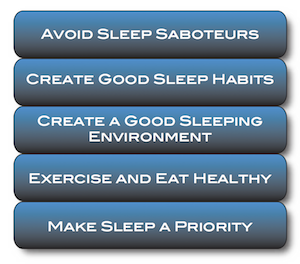In an increasingly hectic world, sleep rarely gets enough attention. Yet, adequate sleep is essential to achieve and maintain good health. So the question becomes, how to sleep better? The following principles provide an outline on how to sleep better. Reap sleep’s healthy rewards with a better night’s sleep.
How To Sleep Better Guide
- Make Sleep a Priority – The number one way on how to sleep better is to make sleep a priority. Throughout the night, your body cycles between deep sleep and REM sleep. This delicate balance repairs your body and mind, aiding in fat metabolism and muscle rebuilding. Any interruption in this cycle is highly detrimental to overall health.

Set aside a healthy seven to nine hours to sleep each night. Contrary to popular belief, you can not train yourself to need less sleep. While you may believe that you are capable of adapting to a lack of sleep, you are not. You continue to lose your ability to think, remember, reason, and/or learn with increasing sleep deprivation. Better sleep makes for a healthier life. (See Importance of Sleep)
- Exercise and Eat Healthy – Moderate exercise (150 minutes each week of moderate aerobic activity plus muscle strengthening activities that include all muscle groups on at least two days a week1) reduces stress and anxiety, allowing you to fall asleep easier and get better sleep throughout the night. Eating healthy and exercising also decrease your chances of developing health problems that negatively affect sleep. (See our Exercise for Men and How To Eat Healthy section for details on optimizing your programs)
- Create A Room That is Dark, Quiet, Comfortable, and Cool – Evaluate your mattress and pillows for proper support and comfort. If they are saggy and unsupportive, get new ones. Your bed should be supportive. Also, create a room that is dark and quiet. Consider installing night blinds to your bedroom window. Consider trying a sleep mask to eliminate any excess light. Consider earplugs to eliminate any excess noise. Also, think about programming your thermostat to decrease the temperature at night by one or two degrees. Cool environments better prepare your body for sleep.
- Create Good Sleep Habits – Creating good sleep habits conditions your body to expect sleep. As a result, your body will naturally fall asleep faster and sleep more soundly. Good sleep habits include the following:
- Go to bed and wake up at the same time each day.
- Keep work materials, computers, electronic devices and television out of the bedroom. The bedroom should be for sleep and sex only.
- Create a relaxing pre-sleep routine devoid of stresses from today and plans for tomorrow.
- Get out of bed if you cannot sleep. Do not let the bed become a place of frustration. If you cannot fall asleep in 30 minutes, get up, read, and return to bed when tired.
- Avoid Sleep Saboteurs – Few people rarely consider the effect of sleep saboteurs on sleep. However, sleep saboteurs can significantly interrupt sleep. Common sleep saboteurs include alcohol, caffeine, excessive fluids, and spicy foods. Below are some simple tips to prevent these sleep saboteurs from interrupting your sleep.
- Avoid alcohol within 3-4 hours of bedtime. (See Alcohol and Sleep)
- Limit caffeine and nicotine.
- Do not drink too much liquid or you will be up all night peeing it out.
- Avoid spicy foods if you get heartburn.
Lastly, if you have health issues like sleep apnea or chest pains or anxiety, how to sleep better depends on you seeking help and treating the underlying problem. Treating the problem can significantly improve your sleep and consequently your overall health.
EMG’s Sleep Homepage: Importance of Sleep
External Resources: National Sleep Foundation: How to Sleep Better
Updated: April 10th, 2015
1. http://www.cdc.gov/physicalactivity/everyone/guidelines/adults.html. How to Sleep Better




